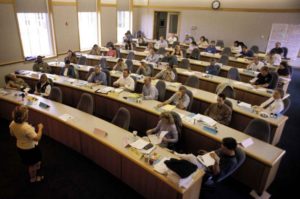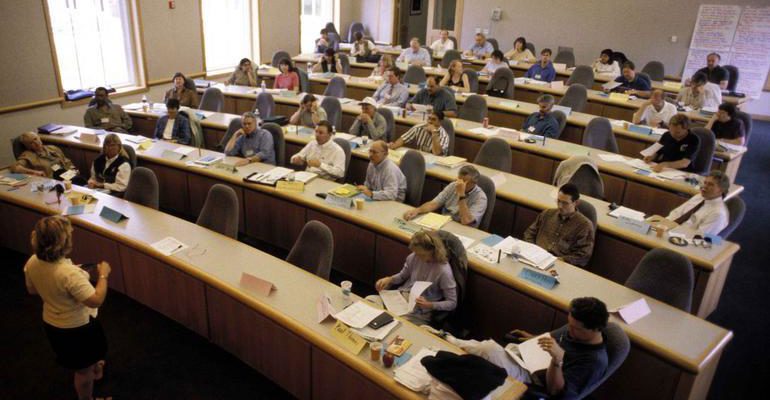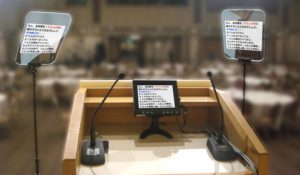“I don’t want you to believe anything I tell you.”
This mantra has been and continues to be repeated daily to all my classes.
 I believe, as did the Bereans, that we should check all information against a standard. In my case, as a biblical professor, I encourage students to go back to Scripture to see if what I’m saying is true. The Bereans did just that because they were “noble, receiving The Word eagerly while examining The Scriptures daily to see if these thing were so” (Acts 17.11).
I believe, as did the Bereans, that we should check all information against a standard. In my case, as a biblical professor, I encourage students to go back to Scripture to see if what I’m saying is true. The Bereans did just that because they were “noble, receiving The Word eagerly while examining The Scriptures daily to see if these thing were so” (Acts 17.11).
 The problem with us educators is that we can fall into the trap of believing what we say is sacrosanct.
The problem with us educators is that we can fall into the trap of believing what we say is sacrosanct.
An Atlantic article this August (here) referenced a letter written by professors from Harvard, Yale, and Princeton. The gist of the article is summarized here:
Monday’s letter argues that “open-mindedness, critical thinking, and debate” are “our best antidotes to bigotry;” that a bigot is a person “who is obstinately or intolerantly devoted to his or her own opinions and prejudices;” and that the only people who need fear open-minded inquiry and robust debate “are the actual bigots, including those on campuses or in the broader society who seek to protect the hegemony of their opinions by claiming that to question those opinions is itself bigotry.”
 Echo chambers – antithetic to open-mindedness – are a real problem in every group. When we only listen to those with whom we agree we become part of groupthink.
Echo chambers – antithetic to open-mindedness – are a real problem in every group. When we only listen to those with whom we agree we become part of groupthink.
We all abide by standards where we measure groupthink. Biblically, I am wary any time factions form pitting viewpoints against one another. Paul identifies the problem when we think our group is better than another. Being “united in the same mindset” is a crucial concern (1 Corinthians 1.10-17)!
 Collaboration is crucial to circumvent groupthink. We should be learning and studying together. In the First Testament, The Law was read aloud to Israelite assemblies (e.g., Nehemiah 8). In the Second Testament, letters were read by individuals within churches as the epistle was addressed to all in a location (e.g., Galatians 1.2). Churches in the 21stcentury should consider the imperative of collaborative learning.
Collaboration is crucial to circumvent groupthink. We should be learning and studying together. In the First Testament, The Law was read aloud to Israelite assemblies (e.g., Nehemiah 8). In the Second Testament, letters were read by individuals within churches as the epistle was addressed to all in a location (e.g., Galatians 1.2). Churches in the 21stcentury should consider the imperative of collaborative learning.
Here are some practical suggestions toward avoiding groupthink:
-
Read, watch, listen to other perspectives within groups averting groupthink (1 John 4.1-6)
-
Remember Jesus’ words: if “others are not against us” they may be “for us” (Mark 9.38-41)
-
Don’t share or post something in social media you have not personally researched. Abide by this simple dictum, “If you don’t know, don’t show” (1 Timothy 5.19)
-
Find the strongest arguments for opposing viewpoints. Engaging the strongest arguments shows honesty toward those with whom we may disagree and strengthens our own position if we disagree (2 Timothy 2.24-26)
-
Stop rumor, innuendo, slander, and gossip: DO NOT give assent to unsubstantiated views (1 Timothy 6.4)
 Just because the culture says so, does not make it so.
Just because the culture says so, does not make it so.
Just because one group says so, does not make it so.
Just because a professor like me stands behind a lectern, does not make it so.
Read The Atlantic article, read others than those with whom you agree, join a group who has a different perspective than yours. Question. Consider. Research.
Be a Berean.
 Mark has gone back to school at IUPUI, studying with brilliant professors with whom he sometimes disagrees. Dr. Mark Eckel is President of The Comenius Institute (website), spends time with Christian young people in public university (1 minute video), hosts a weekly radio program with diverse groups of guests (1 minute video), teaches weekly at his church (video), as well as spends many hours listening, collaborating, researching, and measuring verbiage and viewpoints from a biblical point of view. [Here is my radio interview response to the issue from Moody Radio in Cleveland yesterday.]
Mark has gone back to school at IUPUI, studying with brilliant professors with whom he sometimes disagrees. Dr. Mark Eckel is President of The Comenius Institute (website), spends time with Christian young people in public university (1 minute video), hosts a weekly radio program with diverse groups of guests (1 minute video), teaches weekly at his church (video), as well as spends many hours listening, collaborating, researching, and measuring verbiage and viewpoints from a biblical point of view. [Here is my radio interview response to the issue from Moody Radio in Cleveland yesterday.]


